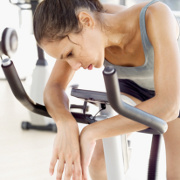 Photo: Getty Images
Photo: Getty Images
Look around in any gym and you will see men and women working out vigorously on stationary bicycles and elliptical trainers. Who is sweating more, the men or the women? Do you know why? Have you noticed that the people who are fit sweat more than the less fit ones? Shouldn’t couch potatoes be the ones spritzing up a storm instead of the exercise buffs?
Researchers in Japan at Osaka International University and Kobe University performed a study comparing the sweat responses of a group of women with a group of men. Each group contained half trained athletes and half untrained volunteers; all of the participants were of similar weight.
The groups were monitored while pedaling stationary bikes. Measurements were made of their maximum oxygen use, intensity of exercise and the amount of sweat coming from various locations of their bodies. The researchers were also able to determine how many sweat glands were active during the exercise since the amount of sweat a person produces is affected by how many glands they are actually sweating from.
Unsurprisingly, the athletic men sweated more than the athletic women but what was a surprise is that the women had the same number of active sweat glands as the men; they just sweated less. And guess how much the untrained volunteers sweated? The unfit women volunteers perspired the least—by a wide margin, even when they stepped up their exercise intensity. As their core body temperatures rose, their bodies finally responded and their perspiration rates increased to cool themselves.
Regardless of whether women are fit or not, they sweat less than men--but why?
According to Timothy Cable, a professor in exercise physiology at John Moores University in England, testosterone is believed to be the cause, as reported in the New York Times. The sweat rates of prepubertal boys and girls have been shown in studies to be roughly the same, but when sex hormones appear on the scene, the response changes. To further demonstrate this “in an experiment conducted decades ago, male athletes were injected with estrogen and sweated less during subsequent exercise.”
The reason why athletes sweat more than untrained individuals has to do with how efficient their bodies respond to exercise. According to Cable, “As someone becomes more fit, his or her body begins to sweat at a lower body temperature in anticipation of more exercise. This is important because the body has a critical core temperature”, and must be cooled or the person’s brain will suffer from the temperature rise.
Women, fit or not, are at a disadvantage when it comes to sweating in extremely hot temperatures. So the next time there is some work to be done outside on a really hot day, send one of the men in your life out to do it explaining to them how much more efficient they are (at cooling themselves).
source:
http://well.blogs.nytimes.com/2010/10/20/do-women-sweat-differently-than-men
Michele is an R.N. freelance writer with a special interest in woman’s healthcare and quality of care issues. Other articles by Michele are at www.helium.com/users/487540/show_articles





Add a Comment2 Comments
Thanks! I checked out your site, nice job! Since you wrote about sweat and pheromones, I thought you might be interested in reading my article on why we have pubic hair at
November 18, 2010 - 1:18pmhttps://www.empowher.com/skin-hair-amp-nails/content/pubic-hair-why-do-we-have-it
take care
This Comment
great article! I also wrote an article about sweating and the Power of Pheremones - fascinating read ; ) ~ check it out at http://www.oceanusnaturals.com/blog/the-power-of-pheremones/
November 18, 2010 - 11:37amThis Comment